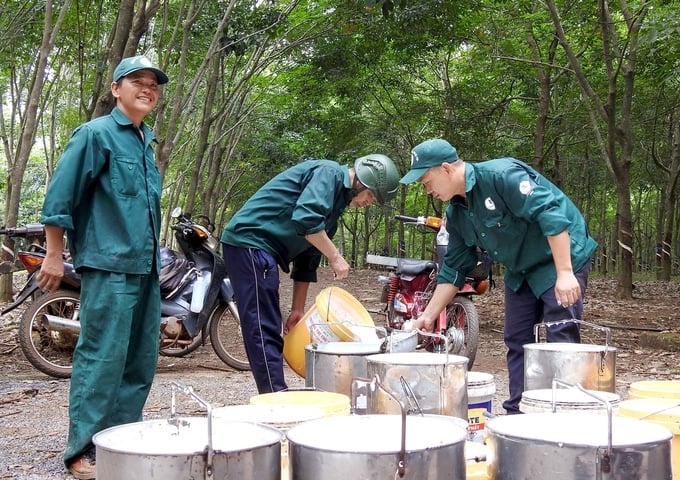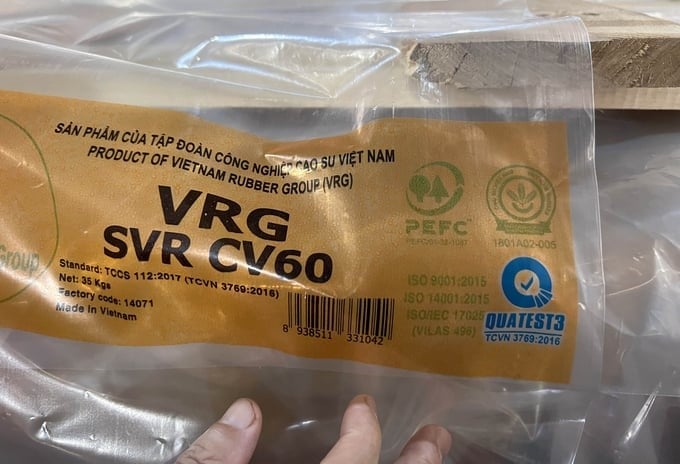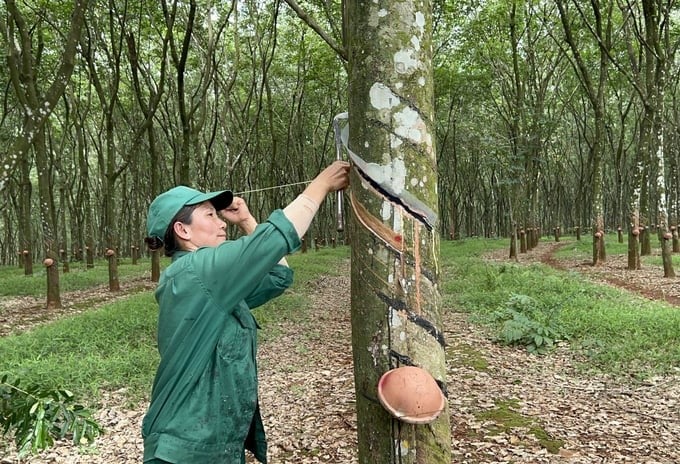May 21, 2025 | 04:23 GMT +7
May 21, 2025 | 04:23 GMT +7
Hotline: 0913.378.918
May 21, 2025 | 04:23 GMT +7
Hotline: 0913.378.918
Vietnam Rubber Group (VRG) has just issued the Group's Green Growth and Sustainable Development Action Plan for 2024. Accordingly, VRG's green growth and sustainable development activities this year include: reducing greenhouse gas emissions; greening the supply chain; greening the production process; and greening the transformation process on the principles of equality, coverage, and enhancing resilience capacity.

Harvesting rubber latex at Ba Ria Rubber Joint Stock Company, one of VRG’s members that is developing forests sustainably. Photo: Thanh Son.
To promote the process of greening the supply chain, VRG will strengthen the marketing of products with sustainable forest management certification. In 2023, although rubber exports faced many difficulties, VRG's consumption of rubber latex and wood with sustainable forest management certification still grew well.
Mr. Le Thanh Hung, General Director of VRG, said that in the past year, the total output of rubber latex with sustainable forest management certification that the Group consumed reached 76,312 tons (48,100 tons in 2022). The consumption of liquidated rubber wood with sustainable forest management certification also increased sharply and reached 2,444 hectares, 7 times higher than in 2022 (347 hectares).
One of the member units with many successfully liquidated rubber wood areas with sustainable forest management certification in 2023 is Dau Tieng Rubber Co., Ltd. During the past year, the company has liquidated rubber wood covering an area of 331 hectares. Of which, 310 hectares participate in the Vietnam Forest Certification System (VFSC) at Tran Van Luu Farm; over 3 hectares at Thanh An Farm and approximately 18 hectares at Minh Hoa Farm participate in the PEFC Due Diligence System (DDS) for rubber gardens.
This year, VRG will continue to build a number of action plans for marketing certified products. Specifically, the Group will provide a list of member units with sustainable forest management certification to rubber customers that the Group is dealing with; actively participate in fairs and trade promotion delegations of the Government, ministries, branches, and associations. At the same time, VRG promotes the promotion of rubber latex and wood with sustainable forest management certification to ANRPC, IRSG organizations, etc.

VRG’s rubber product has PEFC sustainable forest management certification. Photo: Thanh Son.
Besides, VRG coordinates with the Programme for the Endorsement of Forest Certification (PEFC) and the Vietnam Forest Certification Office (VFCO) to introduce more member units that have achieved sustainable forest management certification on PEFC and VFCO websites, as well as connection and introduction channels from PEFC to customers with the need to consume VFCS/PEFC-certified natural rubber latex and wood products.
The Group also directs member units that have been certified for sustainable forest management and chain of custody to proactively develop plans and solutions to promote and consume certified products.
By the end of 2023, VRG had 32 member companies that had developed sustainable forest management plans, reaching 279,304 hectares; 18 member companies were certified for sustainable forest management according to VFCS/PEFC, with about 118,337 hectares; and 38 factories (natural rubber processing, wood processing, and industrial rubber product processing) achieved PEFC-CoC (chain of custody).
In addition to greening the supply chain, in 2024, VRG will continue to implement sustainable forest development solutions.
According to Mr. Tran Cong Kha, Chairman of the Board of Directors of VRG, first of all, the Group builds and implements a roadmap to reconnect with the Forest Stewardship Council (FSC). Actively work with FSC and consulting units to accelerate the implementation process towards the reconnection roadmap with FSC; specify the content of the roadmap, and determine the feasibility of implementing the next steps of the Terms of Reference (ToR) to have an appropriate implementation plan and roadmap.
VRG continues to monitor and support units in implementing sustainable forest management plans to meet Circular No. 28/2018/TT-BNNPTNT of the Ministry of Agriculture and Rural Development on sustainable forest management, sustainable forest management certification according to the VFCS/PEFC-FM system, and product chain of custody certification (PEFC-CoC).
The goal is that by the end of 2024, the Group will have 40–45% of rubber areas and production forests in Vietnam certified for sustainable forest management (VFCS/PEFC-FM) and 75–80% of rubber latex processing factories in Vietnam achieving product chain of custody certification (PEFC-CoC).
In addition, the Group encourages companies to self-deploy additional areas that have not yet implemented sustainable forest management certification beyond the plans assigned by the Group to perfect the management system. Develop and implement solutions for promoting and marketing rubber latex and wood products with sustainable forest management certification.

A rubber garden with sustainable forest management certification from Binh Long Rubber Company Limited. Photo: Thanh Son.
Enhance widespread promotion of the results of implementing sustainable forest management certification to gain recognition from direct consumption units and enhance the value of the achieved certification. Coordinate with state agencies and competent organizations to introduce and enhance the value of certificates to customers who directly use the products and services of the Group and its member units.
The Group continues to drastically implement to achieve the goal of units with sustainable forest certification enjoying forest environmental services according to the Law on Forestry. VRG also researches, learns information, advises, and recommends implementation directions on carbon reserves for the Group's rubber forests, aiming to commercialize carbon credits in the future. At the same time, VRG continues to monitor guidelines on the European Union's deforestation-free Regulations (EUDR). Coordinate with ministries and branches to advise and propose action plans in accordance with this law.
Mr. Le Thanh Hung shared that VRG determines that implementing the Green Growth and Sustainable Development Strategy is investing in future opportunities; implementing green and sustainable activities are also important criteria for helping the Group's products and brands meet customers’ requirements while creating new development opportunities for the Group.
In addition to the favorable conditions from the free trade agreements that Vietnam has signed and come into effect, compliance with new requirements on quality and environmental standards is not only a responsibility but also helps the Group's products have more opportunities in the export market, with plus points demonstrating "responsibility," such as green, sustainable, and environmentally friendly production.
In 2024, Vietnam Rubber Group has set a specific goal of reducing greenhouse gas emissions. Specifically, the Group will reduce greenhouse gas emissions in energy activities by at least 2% compared to the 2023 energy use norm within the scope of greenhouse gas emission activities of energy use.
Reducing gas emissions in energy activities is carried out through both direct and indirect energy sources. Direct emission sources are caused by direct fuel use in production (DO oil, LPG gas, wood, firewood, coal, etc.). Indirect emission sources are due to using energy purchased from outside (electricity, heat energy, etc.).
Translated by Huyen Vu Thu

(VAN) Khanh Hoa is investing over 545 billion VND to develop 240 hectares of high-tech marine aquaculture in order to guarantee a consistent supply of seafood exports and achieve the USD 1 billion target.

(VAN) Minister of Agriculture and Environment Do Duc Duy held a meeting with Soopakij Chearavanont, Chairman of C.P. Group, on May 15.
/2025/05/16/3800-0-nongnghiep-143756.jpg)
(VAN) Suntory PepsiCo Vietnam coordinated with the Ministry of Education and Training to implement an education program on water conservation, reaching nearly 1 million primary school students nationwide.

(VAN) Vietnam’s TH Group officially put its high-tech fresh milk processing plant into operation in the Russian Federation, marking a historic moment as the first TH true MILK cartons were produced in Russia.

(VAN) Use of high-quality broodstock and biotechnology is regarded as the most effective approach to ensuring sustainable and economically viable shrimp aquaculture ahead of climate change and the emergence of increasingly intricate disease patterns.

(VAN) Carbon farming is a form of agricultural practices that helps absorb more greenhouse gases than it emits, through smart management of soil, crops, and livestock.

(VAN) This is a key content of the Memorandum of Understanding recently signed between the Vietnam Fisheries Society and Kunihiro Inc of Japan.